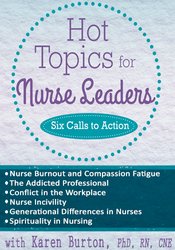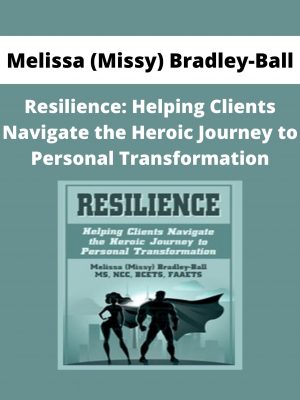Karen Lee Burton – Hot Topics for Nurse Leaders
$219 Original price was: $219.$62Current price is: $62.
Shopping Instructions:
- DISCOUNT 15% : SHOP15
- Product Delivery: Within 1 – 12 hours after purchase.
Gone are the days when nurses spent their shifts perfectly folding bed sheets, giving backrubs, and emptying bedpans.
Karen Lee Burton – Hot Topics for Nurse Leaders
Description:
Katherine, a new graduate RN, walks onto the hospital nursing unit fresh out of school and full of expectations of what she will experience as a nurse. She is eager to apply her new skills and learning, only to discover the other nurses on the floor have been there for many years and don’t especially want to spend their time training her. Some of the nurses actually tell her it will take a while to “fit in” with this long-standing group of colleagues. She hears a lot of gossiping between nurses about other nurses, and overhears nurses talking about her in a negative way. Later in the shift, she notices a nurse acting like she might be impaired, but when she asks about it, she is told to “mind her own business.” She also hears a lot of complaining from older nurses about a new computer charting system being implemented.
Gone are the days when nurses spent their shifts perfectly folding bed sheets, giving backrubs, and emptying bedpans. The role of the nurse in the 21st century has evolved and changed drastically from those earlier days. Nurses today walk into their work settings and have to deal with ever-changing technologies, conflict with patients or co-workers, and a variety of situations which require skills they don’t often learn in nursing school. Nurses of today must be able to think and prioritize care that is much more complex, while at the same time making important split-second decisions and acting as leaders and educators.
In this seminar, you will be “called to action” on six of the most critical contemporary nursing situations: Nurse Burnout and Compassion Fatigue, The Addicted Professional, Conflict in the Workplace, Nurse Incivility, Generational Differences in Nurses, and Spirituality in Nursing. You will leave this training feeling engaged and equipped with real solutions to successfully tackle these practice challenges.
Objectives
- Develop strategies to effectively combat nurse burnout and compassion fatigue.
- Incorporate knowledge of the lived experience of nurses who are addicted by formulating a plan to deal with this issue in nursing practice and leadership.
- Analyze causes of conflict in the workplace to address challenges that present in the future.
- Manage the obvious and more subtle ways in which nurse incivility enters the workplace.
- Explain how generational differences across nurse co-workers affect workplace interpersonal dynamics, work ethic, and work attitudes.
- Distinguish the value that nurses provide when it comes to spirituality in practice.
Outline
Nurse Burnout and Compassion Fatigue
- Examples of burnout’s impact on patient outcomes
- Solutions for combating nurse burnout in self and others
- Dealing with work-related stress in a healthy way
- What is compassion fatigue?
- Has the art of “caring” been lost in nursing?
- Applying empathy in practice
- Priority setting skills for nurses
- Employee assistance programs and other resources
- Call to action: Formulate a plan to reach others regarding the importance of nurse burnout prevention and compassion fatigue
The Addicted Professional
- Are nurses at higher risk for substance abuse than the general population?
- Lived experience of nurses who have experienced addiction
- Fear
- Shame and guilt
- Poor coping
- Increased need to control their environments
- A belief that addiction would never happen to them
- Overall research finding: Nurses in recovery feel misunderstood, judged, and desire acceptance
- Considerations when working with an addicted professional
- Identify your OWN risk for becoming addicted
- Call to action: Formulate a plan to educate nurses about risk for addiction in self and co-workers, signs to look for and how to report suspected problems
Would you like to receive Karen Lee Burton – Hot Topics for Nurse Leaders ?
Conflict in the Workplace
- What is the cause behind the conflict?
- Conflict resolution tips for nurse leaders/physicians
- Conflict resolution strategies for patients/families
- Conflict resolution approaches to use within your team
- Conflict and emotion
- What to say and how to say it (affect)
- Putting conflict into proper perspective
- Role play: Challenging conflict scenarios
- Conflict can be a good thing
- Call to action: Formulate a plan to incorporate new conflict resolution techniques
Nurse Incivility
- The impact of nurse incivility at work
- Ways to promote teamwork and elevate workplace morale
- Encouragement vs. punitive treatment— What results are you hoping for?
- New approaches to welcome nurses to the profession
- Call to action: Formulate a plan to minimize nursing incivility
Generational Differences in Nurses
- Millennials, Generation X, and Baby Boomers
- Perceptions of each generation of the other generations
- Technology impact on the generations of nurses
- Meeting the communication needs across the generations
- Vital need for collaboration and teamwork
- Draw on the strengths of each generation to promote teamwork
- Call to action: Formulate team-building across the generations
Spirituality in Nursing
- Remarkable spirituality experiences in practice
- Increasing comfort with diverse spiritual and religious preferences
- Can nurses go “too far” with influence or support?
- Call to action: Formulate a plan to support spirituality in nursing practice
Related products
HEALTH & MEDICAL
Dr Heidi M Crocker – Yoga Alignment | Speaker: Heidi Crocker EdD, DC
HEALTH & MEDICAL
HEALTH & MEDICAL
HEALTH & MEDICAL
Regina Meredith – Conscious Media Network with Regina Meredith – Eric Pearl on The Reconnection
HEALTH & MEDICAL
HEALTH & MEDICAL
HEALTH & MEDICAL












